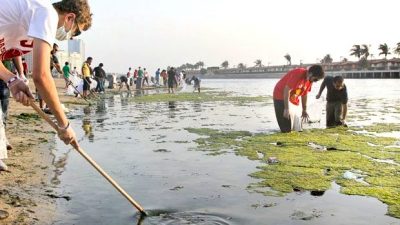 Olympians Wojdan Shaherkani and Sarah Attar landed world records before the Games even began. But online they battle a new war where social media is calling them the “Prostitutes of the Olympics”
Olympians Wojdan Shaherkani and Sarah Attar landed world records before the Games even began. But online they battle a new war where social media is calling them the “Prostitutes of the Olympics”
You know the story: two teens arrived in London as the first women athletes to ever represent the Kingdom of Saudi Arabia (KSA), where conservative clerics forbid women’s participation in sports. KSA wasn’t alone in coming late to the party: Brunei and Qatar also sent female athletes for the first time this year. But the post-Olympiad tongue-lashing these women are now suffering sets Saudi culture apart once again.
Saudi delayed until mid-July the announcement that their Olympic team would include women, a decision following months of negotiations between their government and the International Olympic Committee (IOC). Without women in their ranks, the KSA Olympic team would’ve likely been disqualified.
Saudi women lack the framework to develop into world-class athletes: they’re forbidden from entering all-male national trials, making it impossible for them to qualify for international competitions. So these competitors never actually qualified for their events, but, instead, were given special invitations by the IOC.
Their performances were unimpressive. Shaherkani was defeated in her first judo match after only 82 seconds and Attar finished last in her 800-meter dash. The results were not surprising; but how brave for these underpups to compete. What was surprising were horrendous comments uploaded on social media.
Shaherkani received a standing ovation from the crowd as she left the arena alongside her father, but the online reaction was far less supportive.
Ultra-conservatives opposing the women’s participation vented on blogs and social media, questioning the teens’ morality using extremely offensive terms.
Saudi sports analyst, Fahd al-Rouqi, made an outrageous television announcement that he hoped to die before ever seeing a Saudi woman in the Olympics. (I can find no reports as to his post-Games demise).
A flurry of Twittering ensued. Gulf News repeated one comment that described Shaherkani as “sea remnants” (tarsh bahar), a racist term that describes immigrants to Mecca from outside KSA. Others accused American-born Wojdan of impersonating a Muslim, positing that she might not even be a Saudi.
A Saudi Twitterer allegedly called Sultan Al Hilali spread the hashtag #عاهرات_الاولمبياد which translates to “the Prostitutes of the Olympics”, referring to the women’s Olympic participation. This prompted angry responses, but, stunningly, also vocal support.
Another Twitter hashtag translates into “Nawaf offers up Saudi women to the Olympics”, referring to Prince Nawaf bin Faisal, head of the General Presidency of Youth Welfare. It attracted tweets condemning the Prince for “folding to the West”, a view repeated by clerics. An editorial on the backlash appearing in The Guardian prompted another stream of public outrage.
Yet what some view as unacceptable violations of human rights, others see as respectful protection. “Saudis are right to keep their culture”, said one commenter. “The Guardian will not be satisfied until every country in the world enforcers their narrow urban cosmopolitan Western views on everyone”, said another.
“There are plenty of women in Saudi who look at Western feminism and thank their lucky stars that they are not used and abused in the way Western women are. I find the idea of Western women calling themselves sluts in public to be demeaning”, one reader wrote.
Another stated, “We all know these female athletes in the Olympics are sexualized in the reporting and presentation. Just look at beach volleyball. The Saudis should refuse to send women to the games until the Olympic committee decides to treat women with the respect they deserve”.
Several Saudi-themed blogs refer to books and fatwas against women in sports, often quoting one particular author (Al Shathri) who argues that physical education will require girls to undress in front of each other “opening the evil door of lesbianism, admiration and their hearts getting attached to each other.”
I went to an all-girls high school: I’ll testify that my heart never entangled with my classmates’ tickers, despite many a post-field-hockey-shower. (Disclaimer: this writer finds no problem with said heart attachments).
Shaherkani’s father has said he will legally challenge his daughters’ disparagers whose hateful comments could be labeled libelous; she may be entitled to claim for serious damages and demand a public apology as well. Attar has not commented.
Activist Manal al-Sharif, who led a campaign to allow Saudi women to drive, described Wojdan’s participation in the London Olympics as historic. “For us Saudi women judoka Wojdan is a champion,” she said on Twitter.
United Arab Emirates Foreign Minister Shaikh Abdullah Bin Zayed Al Nahyan tweeted: “Thank you, Wojdan Shaherkani.”
Neither Wojdan nor Sarah have been officially recognized by the Saudi government as Olympic competitors: few Saudis have spoken in their support.
Western media celebrated the news as a revolution in women’s rights, but I think that interpretation’s overblown. Social activists and human rights organizations inside KSA grapple with child marriage, judicial discrimination against women, opening educational and employment opportunities, and lifting the ban on women driving. Women in sports are understandably not top priority.
Does the IOC have a responsibility to leverage the Olympics in challenge of human rights restrictions? They expelled South Africa from the Games in 1970 for its racist policies: that ban remained effective for 21 years until apartheid finally ended. Seems an appropriate precedent to flexing their political muscles here in the Middle East.
tristan tan / Shutterstock.com




The entire Olympics was one big fraternity styled pimps party anyway…
Ummer
Why so cynical? You see nothing genuine in the games? Sure there’s loads to criticize, but I think the Olympic ideals are admirable, and “environmental” in that they essentially reinforce that we are all connected, players on the same field.